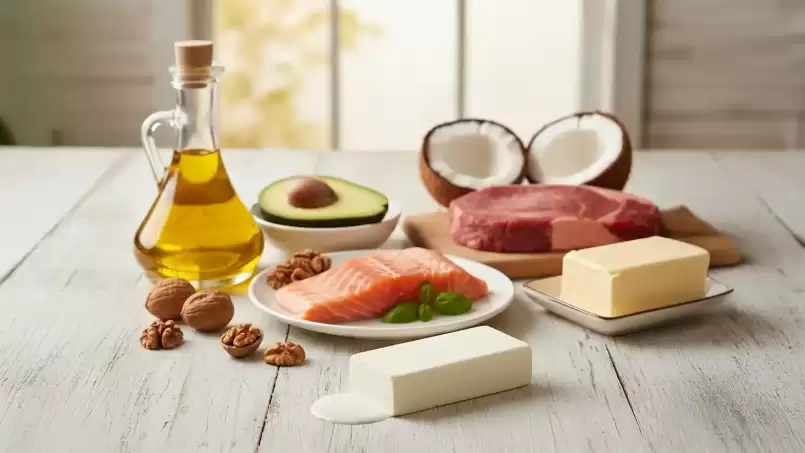Types of fats: saturated, monounsaturated, polyunsaturated, hydrogenated

Which types of fat are good and which are bad? Fats are not all the same. Some nourish cells, others clog blood vessels. Find out which types of fats - saturated, monounsaturated, polyunsaturated and hydrogenated - and how they can be used intelligently for natural health, inspired by ancient therapies and cures.
What are fats and why are they essential for the body?
Fats are an important source of energy and help the absorption of fat-soluble vitamins (A, D, E, K), protect internal organs and maintain skin and brain health. Despite their negative reputation, not all fats are harmful. The difference is their chemical structure and the way they are processed or consumed.
In popular tradition, it was believed that "good fat nourishes, bad fat makes you sick
". Today, science confirms this simple truth, showing that some natural fats may even be therapeutic.
1. Saturated fats
Saturated fats are solid at room temperature and generally come from animal products or tropical vegetable fats.
Natural sources:
- Butter and homem-made sour cream
- Pork fat (lard), tallow and duck fat
- Coconut oil and unrefined palm oil
Health effects:
Moderate consumption of natural saturated fats can support hormone production and nervous system function. Excess, however, increases LDL cholesterol and narrows arteries.
In ancient cures:
In traditional Romanian medicine, pork lard or badger lard was used externally for rheumatic pains and colds due to its local anti-inflammatory effect. In small doses, it was considered 'winter energy'.
2. Monosaturated fats
These fats are liquid at room temperature and solid in the refrigerator. They are considered "good fats" because they reduce bad cholesterol (LDL) and protect the heart.
Natural sources:
- Extra virgin olive oil
- Avocado oil
- Almonds, hazelnuts, cashew nuts
- Sesame seeds and cold-pressed rapeseed oil
Benefits:
Support heart health, reduce inflammation, boost immunity and improve insulin sensitivity. In Mediterranean diets and modern herbal therapies, olive oil is a symbol of longevity.
"A tablespoon of raw olive oil a day keeps the doctor away."
3. Polyunsaturated fats
This category includes Omega-3 and Omega-6 essential fatty acids, which the body cannot produce on its own. They have to come from your diet.
Sources of polyunsaturated fats:
- Oily fish (salmon, mackerel, sardines)
- Flax, chia, hemp seeds
- Raw nuts and peanuts
- Cold-pressed sunflower oil
Therapeutic role:
Polyunsaturated fats reduce inflammation, protect the cardiovascular system and support brain function. In herbal therapies, linseed oil is used both internally and externally for skin regeneration and liver detoxification.
4. Hydrogenated (trans) fats
These are artificial fats, created industrially by hydrogenating vegetable oils to make them more stable and solid.
Examples:
- Cheap margarine
- Industrial bakery products
- Snacks and crisps
- Foods fried in reused oil
Harmful effects:
Hydrogenated fats increase bad cholesterol, favor chronic inflammation and cardiovascular disease. In natural medicine, they are considered "dead fats" with no vital value for the body.
5. Other lesser-known fats
Natural trans fats
Found in small quantities in dairy and meat of ruminant animals. Unlike artificial fats, they are not dangerous in moderate amounts.
Medium-chain trans fats (MCTs)
Coconut oil and MCT oil are rapidly absorbed and converted into energy. They are recommended for weight loss and brain support. In some herbal therapies, they are used for detoxification and liver support.
Comparing types of fat
| Fat type | Source | Effects | Recommendation |
|---|---|---|---|
| Saturated | Butter, lard, coconut | Energetic but may increase LDL | Moderate consumption |
| Monunsaturated | Olives, avocado, almonds | Lower cholesterol, anti-inflammatory | Moderate daily intake |
| Polyunsaturates | Fish, linseed | Protect heart, brain | Essential daily |
| Hydrogenated | Margarines, fast food | Harmful, inflammatory | Total avoidance |
The role of fats in herbal therapies
In phytotherapy and apitherapy, natural fats are carriers of active substances. For example, olive oil is used as a base for oily macerates of medicinal plants (St. John's wort, marigold, lavender).
Cold-pressed vegetable fats help detoxify the liver, heal the skin and support the brain in times of stress or chronic fatigue.
Recommendations for a balanced diet
- Eat a daily source of natural fats (cold-pressed oils, nuts, seeds, avocado).
- Completely avoid hydrogenated fats in processed products.
- Combine Omega-3 and Omega-6 sources for anti-inflammatory balance.
- Use olive oil raw, not fried, to preserve its beneficial properties.
- Include natural butter or ghee in moderate amounts for energy and satiety.
🧠 Did you know...?
- 🥥 Coconut oil was used in ancient times as a cure for immunity and to strengthen hair and skin.
- 🐖 Pork lard naturally contains vitamin D and was considered the "winter energy" of Romanian peasants.
- 🐟 O mega-3 fatty acids in oily fish reduce inflammation and can improve memory and mood.
- 🌿 Cold-pressed oils preserve natural antioxidants and can be used in therapeutic herbal macerates.
- 🫒 A tablespoon of raw olive oil a day protects the heart and digestive system - a Mediterranean habit with proven effects.
- 💛 Good fats help absorb vitamins A, D, E and K and regulate natural hormones.
- 🔥 Trans (hydrogenated) fats don't exist in nature - they are industrially produced and can promote cardiovascular disease.
- 🥑 Avocado is an excellent source of monounsaturated fats that lower cholesterol and boost immunity.
- 🌸 F laxseed oil was used in folk medicine to detoxify the liver and treat eczema.
- 🧘♀️ Natural fats support the nervous system and can help reduce stress and anxiety.
Closing note
Fats are an essential part of nutrition, but the key lies in balance and naturalness. Choose clean, cold-pressed sources and avoid industrial products. In the ancient healing tradition, natural food was the simplest medicine. Today, we are rediscovering the same principles through mindful and balanced nutrition.
Comments